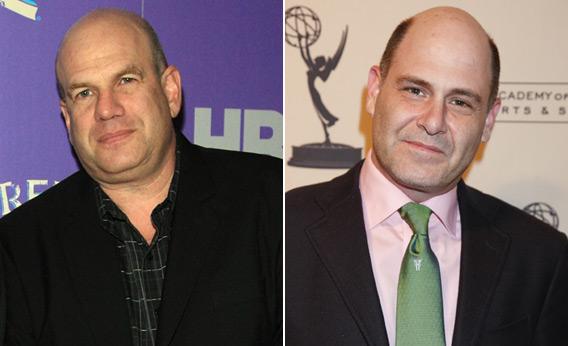If word clouds were physical objects that floated above actual cities, the word collaborative would no doubt loom large over Los Angeles: In any discussion of how television gets made, it’s the go-to description of the small screen’s creative process. It takes a village—and an endless supply of Red Vines and coconut water—to make a TV show.
But television’s cooperative worker bees are bossed about, and in some cases bullied, by godlike showrunners. And, according to a New Republic piece by Craig Fehrman, TV critics are giving those showrunners way too much credit for what he calls “this reputedly golden age of television.” The basic message of the piece—a review of Brett Martin’s forthcoming book Difficult Men: Behind the Scenes of a Creative Revolution, disguised as a think piece—is this: Showrunners, they ain’t alla that.
Fair enough. I’m sure every working TV critic would be happy to stipulate that showrunners are not solely responsible for the success or failure of their shows. And, with some notable exceptions, critics do tend to underemphasize the director’s and cinematographer’s role in producing quality television. But Fehrman’s prescription—that critics consistently acknowledge the complicated interaction of actors, directors, writers, and editors behind every creative decision—is impractical. It’s like saying that reporters covering Google would get a more accurate picture of the way the company creates new products by talking to the engineers, designers, product managers, and marketers who work on them than they do by simply interviewing Sergey Brin or Larry Page. That’s undoubtedly so, but it isn’t obvious to me that it would be a better or more interesting story.
Or even, necessarily, a more accurate one—sometimes what matters is not who had the idea, but who OK’d the idea. It is often the showrunner who decides whether or not to approve a casting choice or a visual element; those decisions add up to the showrunner’s vision. The fact that he or she got the idea from someone else doesn’t make such decision-making less crucial.
(It’s also interesting that Fehrman includes Martin in his discussion of TV critic behavior—one of my biggest criticisms of Difficult Men is that Martin is so keen to establish that he isn’t a member of the TV-writing tribe that he is dismissive of TV critics, often depicting them as unprofessional fanboys and fangirls.)
In many ways, the emergence of the showrunner is intensely dysfunctional. As anyone who has worked in journalism—or any other idea-based business—knows, originality and intelligence don’t necessarily correlate with management skills. Showrunner is the top perch on the TV-writing career ladder; it’s the difference between bossing and being bossed. And for the studios and networks that must decide whether to employ a showrunner, the choice is between handing over control and potentially losing their talents. Running a creative endeavor means finding a balance between those sometimes difficult weirdos who see and say things differently and more down-to-earth practical types charged with managing their output. (In journalism we call these roles writer and editor.)
Television seems skewed toward the imaginative weirdos; Difficult Men is full of examples of showrunners who are addicts and arrogant assholes. Given the nature of the role, it’s a miracle they’re not all that way.
And personally, I’m glad that there’s a place where writers rule, even if showrunners are like Queen Elizabeth II, with less power than their big castles and associated pageantry would seem to suggest. I’m also not worried about the “showrunner fallacy” as it affects journalism. Sure, magazines publish long profiles of showrunners—and thank goodness, I love them—but they also publish reviews and recaps and roundtables, business stories and oral histories, and all kinds of pieces.
